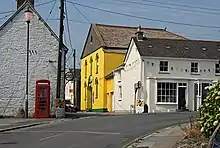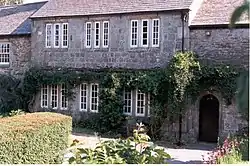Probus, Cornwall
Probus (Cornish: Lannbrobus) is a civil parish and village in Cornwall, England, in the United Kingdom. It has the tallest church tower in Cornwall.[1] The tower is 129 feet (39 m) high, and richly decorated with carvings.[2] The place name originates from the church's dedication to Saint Probus.[3] The parish population at the 2011 census was 2,299,[4] whereas the ward population taken at the same census was 3,953.[5]

History
There was a monastery here before the Norman Conquest which continued to exist until the reign of Henry I. King Henry gave the church of Probus to Exeter Cathedral and the clergy of Probus thereafter were a dean and five canons (the deanery was abolished in 1268 and the canonries in 1549). The first vicar was instituted in 1312; the parish had dependent chapelries at Cornelly and Merther. The church was built mainly in the 15th century but the tower was still under construction in 1523. In the church is the brass of John Wulvedon and his wife, 1512.[6] In the early years of the 19th century the rare custom of turning to the East for the Doxology at the conclusion of the recitation of each Psalm, particularly by those in choir, was observed in Probus church.
There are records of no less than nine medieval chapels in the parish and three more of which traditions exist. Two mansions formerly existed at Golden: one of the Wolvedon family and a larger one of the Tregians. The line of Wolvedons became extinct in 1514. At the Tregian mansion the Catholic martyr Cuthbert Mayne was arrested in June 1577.[7] The farmhouse at Golden contains the remains of a hall-house of the late 1530s, reconstructed about a century later, and extended in the 18th century. There is also a fine barn with original roof timbers and a first floor window.[8] Trewithen House was built in 1723.[9]
Trelowthas Cross was found in the 1940s at Trelowthas. Great Trelowthas was the site of one of the medieval chapels in the parish, recorded as licensed in 1379. Probus was one of four places in Cornwall having a right of sanctuary which extended beyond the walls of the church, the others being Padstow, St Keverne and St Buryan. The missing Carvossa cross is thought to have marked the eastern limit of sanctuary and it is likely that this cross marked the western limit.[10]
An annual market and fair was held here from 1321.[11]
Geography and wildlife
Trehane Barton is the former home of the Stackhouse family and a Site of Special Scientific Interest. When the SSSI was notified in 1989 the barns supported the largest known breeding colony of Greater Horseshoe Bat in Cornwall and one of only eleven known colonies in Britain.[12] No bats were present during a visit in October 2010 to access the site which was given an "unfavourable no change" condition.[13]
Transport


Probus lies very close to the Cornish Main Line railway and was formerly served by the Probus and Ladock halt. It is also situated off the A390 road. Probus is served by local bus services between Truro and St Austell, provided by First Group and formerly Western Greyhound (before the company became defunct in March 2015), and also by National Express providing links to further destinations.
Culture
The Hawkins Arms, a St Austell Brewery house, is an 18th-century pub located on Fore Street. The Comrades Club is a members' club situated on The Square.
The Probus Parish Players, formed in 1991, holds an annual pantomime in the Village Hall.
Probus has a Probus Club, the Probus Club of Probus.
County Demonstration Garden
The County Demonstration Garden and Arboretum (six and a half acres) formerly belonged to the Trewithen estate. It was established by the County Horticultural Adviser to show what can be done in a small Cornish garden. There were a variety of gardens: for acid and limey soils, labour-saving gardens, patio gardens, shrubs for walls and plots for fruit and vegetables. Another part of the site had plants which originated in Cornish gardens such as Camellia 'J. C. Williams' and Ceanothus 'Trewithen Blue' and a series of plants arranged chronologically by date of introduction.[14] The Garden closed in 2004 and the land used for a garden centre development. [15]
Sports and recreation
Probus has a King George's Field, a memorial to King George V.
Notable residents
- John Stackhouse, botanist
- Francis Tregian the Elder, landowner and recusant, and his son Francis Tregian the Younger, believed to be the copyist of the Fitzwilliam Virginal Book
References
- Pevsner, Nikolaus (1951). Cornwall. The Buildings of England (1st ed.). Harmondsworth: Penguin Books. p. 128.
- Lambert, J. W. (1939). Cornwall. Penguin Guides (1947 ed.). Harmondsworth: Penguin Books. p. 81.
- Mills, A. D. (1991). The Popular Dictionary of English Place-Names. Parragon Book Service Ltd & Magpie Books. p. 264. ISBN 0-7525-1851-8.
- "Parish population 2011". Retrieved 11 February 2015.
- "Ward population 2011". Archived from the original on 11 February 2015. Retrieved 11 February 2015.
- Dunkin, E. (1882) Monumental Brasses. London, Spottiswoode
- Cornish Church Guide (1925) Truro: Blackford; pp. 187-189
- Pevsner, N. (1970) Cornwall; 2nd ed., revised by E. Radcliffe. Penguin; p. 74
- Historic England. "Trewithen House (1141100)". National Heritage List for England. Retrieved 8 September 2016.
- Langdon, A. G. (2002) Stone Crosses in Mid Cornwall; 2nd ed. Federation of Old Cornwall Societies; p. 63
- Samantha Letters, "Gazetteer of Markets and Fairs in England and Wales to 1516: Cornwall"
- "Trehane Barton" (PDF). Natural England. Retrieved 2 November 2011.
- "Trehane Barton". Natural England. Retrieved 2 November 2011.
- Synge, Patrick (1977) The Gardens of Britain; Vol. 1: Devon and Cornwall. London: B. T. Batsford; pp. 98-99
- https://www.cornwallgardenstrust.org.uk/probus-gardens/
Further reading
- Shaw, Thomas (1961) Methodism in Probus, 1781-1961